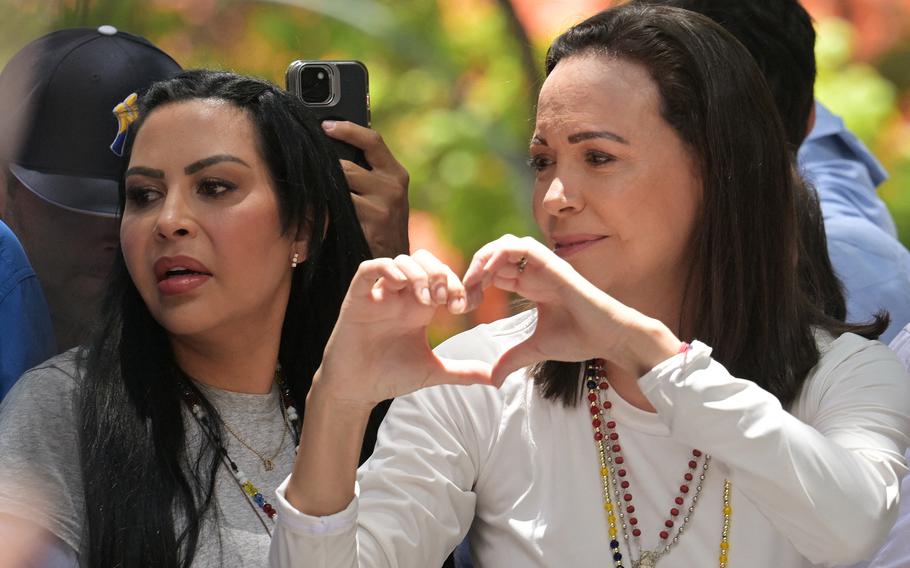
Venezuelan opposition leader Maria Corina Machado gestures to supporters next to opposition figure Delsa Solorzano during a rally in Caracas on Aug, 28, 2024. (Juan Barreto, AFP, Getty Images via TNS)
(Tribune News Service) — Venezuelan opposition leader María Corina Machado said Thursday she has no plan of leaving her country even as the Nicolás Maduro regime moves to imprison the leadership of her democratic movement.
Machado, who shared her outlook for the country’s democratic struggle in two public events on Thursday, said Caracas’ socialist regime is growing desperate and isolated amid claims that Maduro stole July’s presidential election, and that this makes him increasingly more dangerous.
“Every day that goes by is harder and riskier. We face a ruthless regime that is willing to do anything in terms of forcing people, blackmailing people, threatening people and their families, and that has no limits to its cruelty,” Machado said in a video press conference with foreign media.
“Nonetheless, I believe my duty is to stay in Venezuela, to assist our teens and our people that are in prison or in hiding, and we are doing as much as we can to take care of ourselves,” she added.
Her comments came a few days after the regime’s Attorney General ordered the arrest of presidential candidate Edmundo González, who alongside Machado currently heads the Venezuelan opposition, accusing him of forging public documents, conspiring against the government and promoting public disobedience.
The Venezuelan judiciary, which has often been described by the United Nations and other international organizations as a persecution tool subservient to Maduro, claims that González and Machado have been conspiring against the government by forging the election tallies backing their claim that Maduro lost the election to González.
Machado and Gonzalez have been in hiding in Venezuela for some time, suspecting that the regime would eventually move to arrest them alongside the close to 2,000 people Maduro has already detained as part of the latest wave of repression.
Claiming that Gonzalez defeated Maduro by margin of more than 2-1, the opposition published the official vote tallies, known as actas, gathered in more than 80% of the country’s voting stations.
Doubts about the official electoral council’s results have also spread to the international community, leading a number of governments to repeatedly ask Maduro to produce the documentation proving his victory. To date, the regime has failed to do so.
Describing Maduro’s wave of repression as the worst seen by Venezuelans in recent years, Machado said that the Venezuelan people have courageously confronted what the world now understands to be a bloodthirsty dictatorship, and find themselves in the midst of an existential struggle that will define the nation.
“That is why our movement is so strong and it is why it does not have a way back,” she said.
The July 28 election demonstrated that Venezuela is no longer a polarized nation and that the vast majority of people want an end to Maduro’s dictatorship to regain their freedoms and hope for the future, she added, and that while the official tallies gathered by the opposition had González wining by nearly 70% of the vote, that margin would had been closer to 90% had the Venezuelan voters who were forced to leave the nation in recent years been allowed to participate.
Machado said Venezuela’s democratic movement is currently following a plan to confront Maduro and erode his internal support within the military and his security apparatus, but that protests against the regime have been carefully orchestrated in an attempt to minimize the risk of imprisonment for the opposition’s supporters.
The fight for country’s freedom was never going to be easy, she said, emphasizing that Venezuelans are facing a regime that is essentially a criminal structure, but added that this time Venezuelans understand that this is a fight to the end.
Nevertheless, Venezuelans could use a more decisive reaction from the international community to hold accountable the regime leaders people responsible for crimes against humanity.
“I certainly think that the United States should do much more. And I’ve been very clear with them and with other countries”, she said. “I think that perpetrators of human rights violations and crimes against humanity should... be held accountable, because it sends a message to the rest of them that it is in their best interest not to commit those crimes.”
©2024 Miami Herald.
Visit at miamiherald.com.
Distributed by Tribune Content Agency, LLC.